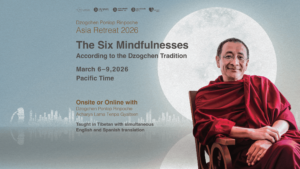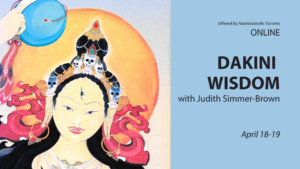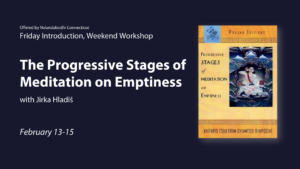Singing the key instructions
Isn’t meaningless,
It’s the lineage tradition¹
—Khenpo Tsultrim Gyamtso Rinpoche
They sing!
This joyous thought sparkled in my mind amid a crowd of happy students packed into a shrine room at Marpa House in Boulder, Colorado, in the fall of 2003. It was my first encounter with Khenpo Rinpoche’s blissful presence and the profound practice of singing songs from the Kagyu lineage forebears. Easy to remember, these songs pass down instructions we can apply to our lives.
As a lifelong performer and aspiring singer-songwriter, I knew I was in the right place. The feeling of belonging and participating in something bigger than ourselves was palpable, and joy resounded in the air.
The Songs of Realization are inspiring and beautiful, and their meanings are deep. The act of co-creating this music as a group and engaging the wisdom it conveys creates harmony, a felt experience in both song and community. This is what most deeply resonates with me when I think about sangha: the synthesis of voices, dreams, and activities of individuals in a shared ecosystem.
The Sanskrit word sangha is translated as “assembly” or “community.” The Tibetan word for sangha, gendun (dge ‘dun), is a portmanteau meaning “oriented toward virtue.” Thus the sangha is a group of people who share the intention to be of benefit. Like the members of a choir, each person brings their own unique, dynamic expression to the ensemble. Being harmonious does not mean being all the same. The convergence of diverse voices merging and vibrating with each other makes the collection more than the sum of its parts.
Ours is a living tradition. We sing together and share these teaching songs like a lit candle igniting others from its flame. If our voices seem less than perfect, even if we think we sound like a howling dog, we know we are all in this chorus together. In the sangha we share the intention of being kind to ourselves and others. Dissonance is not viewed as a problem but is an opportunity to remember our commitment to compassion. We can explore harmonizing even, and especially, during the discordances that inevitably come with being in community.
We have the family we are born into, and the one we choose as we mature. Sangha provides opportunities to learn and grow together, to continually stretch our comfort zones through our individual and shared experiences, to be kind—and to sing!
¹Translated by Ari Goldfield, August 5, 2007. Translation © 2012, Ari Goldfield.
Contemplation
Listen to a song you love, noticing the different instruments, voices, and layers as they merge. Their union produces something that is beyond one and many. The spectrum of frequencies weaves together and produces joy in your heart. Experience what it feels like to engage with others as if you were all in the same orchestra and the song is your life. Just sit. Relax.
Khenpo Rinpoche’s Songs of Realization are available at https://www.ktgrinpoche.org/teachings/songs

Nick Vail is a Karunika (teacher) for Nalandabodhi who lives in Maine.
A single parent, he enjoys quality time with his son, being in nature, playing the guitar, singing, dancing, and meditation.






